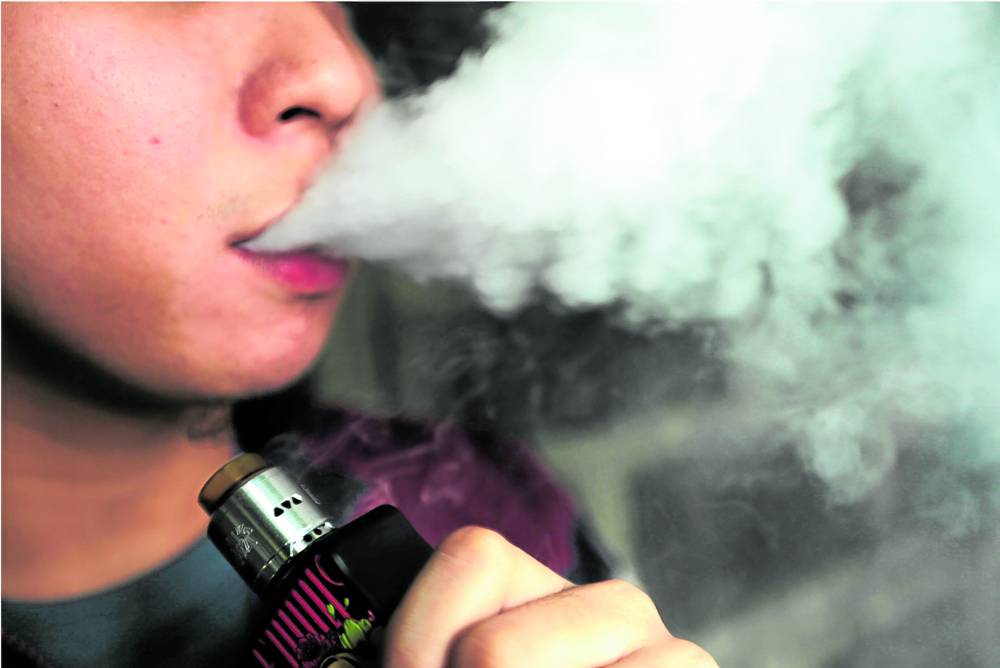DepEd, doctors ask Duterte: Veto vape bill

A man uses vape or a device used for inhaling vapor containing nicotine and flavoring, as defined in the dictionary. INQUIRER PHOTO
MANILA, Philippines — The Department of Education (DepEd) and public health experts are one in urging President Rodrigo Duterte to veto the “antihealth” vape bill that, among others, lowers the age of access from 21 to 18.
“We teach in schools how the part of the brain that is responsible for rational decisions does not fully develop until one is in their mid-20s,” the DepEd said in a statement on Thursday.
“If there will be any attempt to amend existing laws, it should be to increase the age of access to harmful products, not lower it,” it said.
Under Republic Act No. 11467, the sale of tobacco and vapor products to persons below 21 is prohibited and punishable with a fine of P10,000 and imprisonment of 30 days.
If the President signs the proposed Vaporized Nicotine Products Regulation Act into law, it will “erode the important provisions already set forth” in RA 11467, particularly the lowering of age restriction, the DepEd said.
In an online briefing, Health Secretary Francisco Duque III and other medical doctors said the public should not be misled by the measure’s proponents and supporters.
Duque said the bill was “masquerading as a solution to a decadeslong problem of tobacco use” and a “retrogressive policy that undermines the country’s progress in tobacco use prevention and control.”
Dr. Riz Gonzalez of the Philippine Pediatric Society (PPS) debunked claims that the measure was an “antismoking bill” offering “a pragmatic approach to the smoking problem.”
Young and vulnerable
The DepEd said that “as a government institution championing young Filipinos’ well-being, we are taking a stand against the so-called ‘antihealth’ vape bill, which will weaken an existing law and the executive order against … e-cigarettes or vapes.”
It pointed out that before their mid-20s, young people were “very vulnerable” to risky behaviors including substance use and abuse.
Per the DepEd information system, at least 870,000 students in the basic education sector are 18 years old, and an estimated 1.1 million in senior high school are between 18 and 20.
“This is the number of learners who will become legally allowed to be marketed the harmful products once the bill becomes law,” the DepEd said.
It pointed out that the measure would also allow online sales and permit other flavors than those currently allowed by law.
It cited the position of the World Health Organization that vapes “are undoubtedly harmful, and that flavors appealing to children and advertising through social media platforms are among the tactics employed by tobacco and related industries to attract younger generations.”
“This is of great concern for us in DepEd,” it said, noting a PPS study finding that 6.7 percent of Grade 7 to Grade 9 learners had tried and were using e-cigarettes.
Online accessibility, varied flavors, and the belief that vapes are safer than tobacco were among the top reasons cited as to why young learners are using the product.
In February 2020, Duterte signed Executive Order No. 106, which bans the unauthorized manufacture, distribution, and sale of e-cigarettes and heated tobacco products.
Gonzalez pointed out that the goal of tobacco and nicotine regulation was “to quit, not to shift.”
“And there has been no study to prove that e-cigarettes were successful in [helping smokers] quit. And what’s alarming is that there are children who jump into this habit, and they are nonsmokers,” Gonzalez said.
Citing a study in the United Kingdom conducted from 2008 to 2016, Dr. Ulysses Dorotheo of the Southeast Asia Tobacco Control Alliance said the claimed decline in smoking prevalence with the introduction of heated tobacco products was “complete hogwash.”
Dorotheo said smokers did not actually quit smoking but became “dual users” of regular cigarettes and e-cigarettes.
He called out doctors claiming that vaping products were less harmful and would therefore save smokers’ lives, saying e-cigarettes produced aerosol that contained toxic chemicals also found in tobacco smoke.
Dr. Benito Atienza said the bill’s relaxed restrictions on vape flavors and minimum age of access were deliberate attempts to draw the youth into vaping.
“What we are [suggesting] in the medical community is that vape should be prescribed by a doctor so that it can be regulated,” said Atienza, a pediatrician and the president of the Philippine Medical Association.
Another contentious provision in the bill is the transfer of regulatory powers from the Food and Drug Administration to the Department of Trade and Industry—a move that, Dr. Boss Sobremesana of the Department of Health said, was inconsistent with public health goals.
Heated tobacco and vapor products “are considered products that can endanger human lives,” Sobremesana said. “Therefore, they should be classified as medical products, and not consumer products.”
RELATED STORIES
Groups urge Duterte to veto vape bill